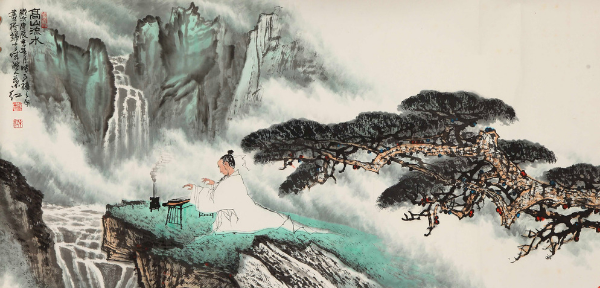成语故事:开卷有益
宋朝皇帝宋太宗统一全国后,宏扬传统文化,收集文化资料、整理大量古籍。下令编纂规模宏大的分类百科全书——《太平总类》。宋太宗尤其重视其中的《太平遍览》,规定自己每天至少要看两、三卷,一年内全部看完,因而将这部书改名为《太平御览》,意思是皇帝亲自阅读的书。
因为政事繁忙,宋太宗经常不能按计划阅读,就在空暇的日子补读。侍臣怕他读得时间太久会影响身体健康,太宗说 :“只要翻开书卷阅读,就会有收益,所以我不觉得疲劳。”大臣们见皇帝如此勤奋,也纷纷努力读书,形成很好的学习风气。 后人用“开卷有益”指读书有益,勉励人们勤奋读书。
绘画 : 谢海
Ler é sempre benéfico
Ao terminar a unificação da sua nação, o imperador Taizong (939-997) da dinastia Song (960-1279) coletou e divulgou numerosos objetos culturais a fim de promover a cultura tradicional. Ele ordenou a compilação da grande enciclopédia Taiping e, dentro dela, atribuiu grande importância a uma seção chamada Panorama Taiping . Concluída a compilação, o imperador passou a ler religiosamente dois a três rolos da enciclopédia por dia, com o objetivo de ler toda a coleção em um ano. O nome da enciclopédia foi então alterado para Leituras Imperiais da Era Taiping, referindo-se ao fato de que ela havia sido lida pelo Imperador.
Ocupadíssimo com os assuntos de Estado, o soberano muitas vezes não tinha tempo de cumprir o plano de leitura. Mas ele procurava compensar nas horas livres. Preocupados com sua saúde, os ministros tentaram dissuadi-lo de passar tanto tempo lendo. O imperador, porém, respondia: “Ler é sempre benéfico”. Profundamente tocados por um imperador tão aplicado, os ministros seguiram o seu exemplo e, assim, formou-se uma cultura que estimulava a aprendizagem. Desde então, a expressão idiomática开卷有益 kai juan you yi (ler é sempre benéfico) tem sido utilizada para incentivar as pessoas a ler diligentemente.
Reading is always beneficial
Having unified the nation, Emperor Taizong (AD 939-997) of the Song Dynasty (AD 960-1279) collected and collated cultural information and consolidated ancient books in order to promote traditional culture. The Emperor ordered the compilation of a massive classified encyclopaedia—The Taiping Encyclopaedia, of which he attached great importance to a section named The Taiping Overview. Once it was completed, he himself made it a rule to read at least two to three volumes of the encyclopaedia every day, with the aim of reading it all within a year. The name of the encyclopaedia was thus changed to the Imperial Readings of the Taiping Era, referring to the fact that it had been read by the Emperor.
However, busy with administrative affairs, Emperor Taizong frequently did not have time to read the encyclopaedia as planned. Therefore, he would make up for the missed reading whenever he had spare time. For the sake of his Majesty’s health, his ministers tried to dissuade him from reading for too long. The Emperor, however, replied, “Reading is always beneficial, and I do not feel tired at all.” Deeply touched by such a diligent emperor, the ministers followed his example and thus a culture conducive to learning was formed. The idiom “Reading is always beneficial” (KāiJuàn You Yì) has been used by later generations to encourage people to read diligentl
Visit 孔子学院 for more




